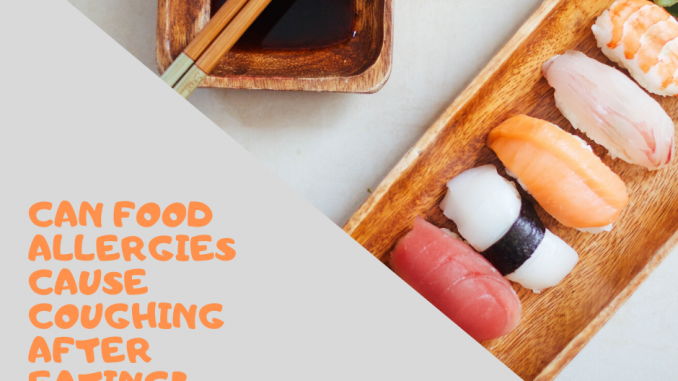
Can food allergies cause coughing? Yes. When you eat certain foods that you are allergic to, you may end up with a cough.
What is food allergy?
Food allergy is your body’s over reaction to certain foods which your body incorrectly sees as threat or harmful. When your body perceives an external substance or food as a danger, your immune system tries to defend and protect you.
When you eat foods you are allergic to, your immune system perceives the food as harmful and tries to fight. To defend you against the allegedly harmful substance, your immune system releases histamines. You start to show allergy symptoms when your body starts releasing histamines.
The primary function of body’s immune system is to fight infections and other dangers to health. Food allergy is when your immune system overreacts to a food incorrectly seeing it as a threat.
Food allergies can appear in people of any age but are more common in children. Some people develop allergy to foods later in life though they have eaten such foods well as children.
What are the symptoms of a food allergy? Is coughing a symptom of a food allergy?
Most of the times, food allergy symptoms are strikingly similar to cold symptoms. These include cough, sore throat, sneezing, nasal congestion, runny nose etc. A food allergy can also cause itchy skin and eyes.
Food allergy symptoms can sometimes be mild but severe at other times. Sometimes food allergy symptoms can show up as mild initially but turn severe later on. It is hard to predict how severe can symptoms to a food allergy can be.
There is no solid evidence that food allergies are hereditary. In some cases, allergies appear to show up in various members of the same family. However it is not possible to predict an allergy in a future generation.
Can food allergies cause coughing?
Some times, eating a big piece of dried fruit such as dried papaya or dried pineapple can trigger a fit of dry cough. Dry cough after eating dried fruit can be caused by the specific fruit or a preservative used in the dried fruits.
Food allergies can cause problems with digestive system, skin, respiration etc. Common respiratory problems a food allergy can cause include cough, wheeze, stuffy nose, runny nose, itchy nose, sneezing or extreme difficulty in breathing.
Most common food allergens include
- Dairy like milk, cheese cream
- Sea food like fish or shellfish
- Nuts like peanuts, tree nuts
- Mustard seeds
- Sesame seeds
- Wheat
- Eggs
- Soy
If you suspect you have food allergy and keep coughing when you eat certain foods, you need to consult your doctor for a detailed examination. Your doctor may refer you to an allergy immunologist or specialist who can identify any allergies you may have.
To avoid allergic cough, you need to avoid eating foods that you may be allergic to. If you continue to eat food that you are allergic to, you risk having a range of allergic reactions some mild and some very severe. The most adverse reaction a food allergy can cause is anaphylaxis.
What is anaphylaxis?
Allergy can sometimes lead to anaphylaxis which can be life threatening. Anaphylaxis is the most severe allergic reaction. Common foods that trigger anaphylaxis include nuts and seafood.
Anaphylaxis symptoms include the below:
- flushed skin
- hives or nettled rash
- feeling low
- swollen throat or mouth
- impaired speech
- asthma attack
- swallowing difficulty
- nausea with stomach pain
- low blood pressure
- breathing difficulty
These symptoms can appear within few minutes or hours after eating the food you are allergic to.
Sometimes a food allergy can produce symptoms similar to a cold or sinusitis. These include runny nose, blocked nose, sneezing or coughing etc. A cold is generally caused by a virus and a sinus infection is caused by bacteria. It is interesting to notice how virus, bacteria and food allergy can cause similar symptoms.
Virus | Bacteria | Food Allergy
Unlike cold symptoms, mild allergy symptoms normally fade away when you stop eating the food you are allergic to. However sometimes allergic reactions to foods can be severe and may require immediate medical attention.
Though allergy can cause symptoms similar to a cold, allergy not contagious whereas a cold be highly contagious. If you have a food allergy you may be more prone to catch a cold than others.
As cold symptoms are caused by a virus, no medicine can treat a cold though some medicines can help alleviate cold symptoms. However, allergy can be treated with medicines. Most common medicine to treat allergy is antihistamine. Antihistamines block histamine reactions and prevent you from showing any allergy symptoms.
Sometimes doctors advise use of a decongestsant when a person suffers severe congestion due an allergic food. Saline sprays and humidifiers can also help alleviate allergic congestion after eating.
A sinus infection caused by bacteria can sometimes produce symptoms similar to a cold or allergic reaction to food. A doctor can establish if your symptoms are from bacterial infection. If the doctor confirms you have a infected sinus he may offer some antibiotics to treat bacterial infection. Antibiotics cannot heal cold or allergic reaction though.
Food allergy | GERD or acid reflux
Food allergy can cause coughing after eating just like acid reflux makes you cough after you eat.
Acid reflux makes you cough after you eat because semi digested food enters your esophagus. Food allergy makes you cough after you eat because your body’s immune system produces histamine when you eat an allergen.
The mechanism of cough due to food allergy is different from acid reflux or GERD cough.

Leave a Reply